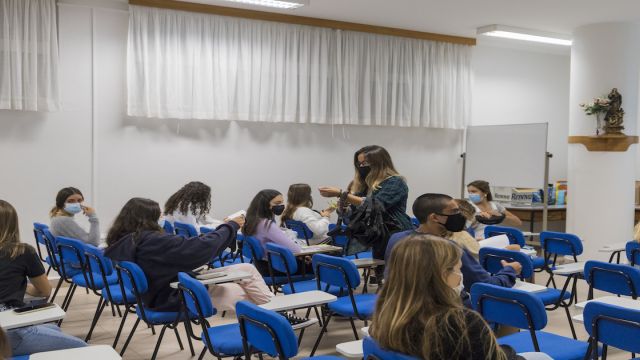
UNICEF International Day is celebrated annually on 11 December.
The United Nations Children's Fund (UNICEF) is a United Nations (UN) body whose purpose is to promote and contribute to children's rights. It is governed by the Convention on the Rights of the Child, fighting for a better world for children, who are the future of humanity.
UNICEF International Day is celebrated on December 11, as it was on this day that it was founded in 1946. At its origin was the desire to help the European children who felt the cruelty of World War II. Today UNICEF is in 193 countries and territories of the world, with its headquarters in New York.
AREAS OF EXPERTISE
UNICEF's mission is to defend and promote children's rights and create lasting conditions for their development. The Convention on the Rights of the Child, the pillar of all our work, recognizes children as a set of rights for them to live, grow, learn in a safe and protective environment, and participate in society.
Throughout more than 70 years, we have achieved real changes in the lives of children around the world. To ensure compliance with the rights of the child, we focus our strategies and programs in these 5 key areas:
Survival and Development:
The early years of a child's life are crucial. When they receive proper care and nutrition, children are better able to survive, grow healthy, and develop physically, mentally, socially, and emotionally.
For UNICEF, it is crucial to ensure adequate food and health, access to safe drinking water, sanitation, healthy habits that prevent and address the main causes of child mortality, such as pneumonia, diarrhea and malaria, ensuring that all children the opportunity to grow in a healthy way. There has been much progress, but much remains to be done:
• 15,000 children die every day before the age of five, most of them due to preventable causes; most of these deaths occur in sub-Saharan Africa and South Asia;
• By 2016, about 2,600 children died within the first 24 hours of life. For nearly 2 million newborns, their first week of life was also the last. The lack of skilled health personnel during childbirth and in the days that follow is one of the main factors contributing to this reality;
• 156 million children suffer from chronic malnutrition in the world, irreversibly jeopardizing their physical and intellectual development;
• 844 million people lack access to safe water and 2.3 billion do not have adequate basic sanitation.
Education:
Education is a fundamental human right. Access to free and quality education is a right for all children.
Ensuring that all children can enjoy the right to quality education is a priority for UNICEF, from early learning opportunities that lay the foundation for success in school, through to secondary education. Recognizing the significant advances of recent years, several challenges remain:
• 61 million children of primary school age (6 to 11 years old) are out of school; more than half are girls;
• There are about 1000 million school-aged children in primary and secondary education, but many do not benefit from quality education due to poverty, conflict, gender discrimination, disability or ethnic origin;
• In many countries, girls face social and cultural barriers that prevent them from going to school, limiting their full development;
• 75 million children were forced to stop their education due to humanitarian crises and long-term conflicts.
Child Protection:
Many children throughout the world are exposed to different forms of exploitation, abuse, violence or exclusion and need protection.
By protecting today's most vulnerable children - by giving them a fair chance - we can help break the cycle of extreme poverty. Investing in the most vulnerable children can have immediate and long-term benefits for both children and society. The protection of all children is urgent, especially the most disadvantaged:
• 230 million children are not registered at birth, which prevents them from having a name, nationality, access to health services, education and protection;
• The number of children affected by conflict is increasing and more worrying. Children are victims of extreme violence, and international laws designed to protect them prevent these abuses;
• Children are exposed to infectious diseases and to diverse risks to their physical and moral integrity, lack of food, drinking water and health care;
• 1 in 3 internet users worldwide is a child - very little is done to protect them from the dangers of the digital world and to make their access to online content safer;
• Child labor exists as a result of child poverty and vulnerability. Working children lose their right to education and are exposed to risk situations.
Climate change:
Climate change has short- and long-term consequences on society and threatens sustainable development, relating to other problems such as poverty, inequalities, access to education and health, as well as scarcity of resources.
The Convention on the Rights of the Child recognizes that all children have the right to an early life with the best possible conditions to enable them to grow and develop their full potential. However, climate change, one of the greatest challenges of this century, endangers their rights - from their survival, their well-being, access to water, food and education. It is important to note that:
• More than 500 million children live in areas where extreme precipitation is frequent and 160 million live in regions of severe drought. Most of the children living in areas at high risk of floods are in Asia, with most of those living in drought prone regions in Africa;
• Climate change means rising temperatures, heat waves, floods, droughts and other extreme weather events. These events can cause death and devastation and contribute to the spread of the leading causes of death for children, such as malnutrition, malaria and diarrhea;
• Pollution and lifestyle can cause irreversible changes in the environment and, in turn, jeopardize the survival and well-being of communities and influence the livelihoods of millions of people

























